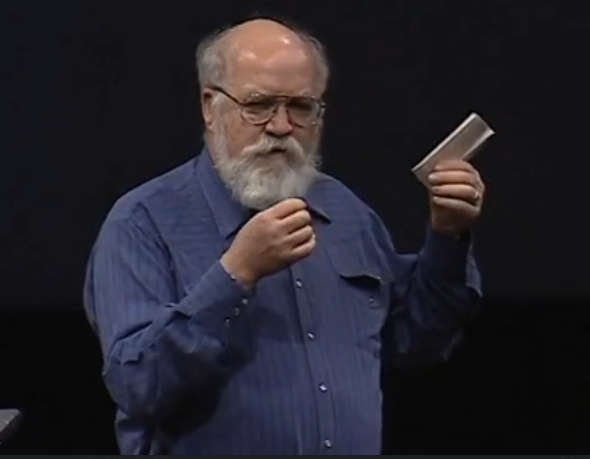So I'm going to speak about a problem that I have and that's that I'm a philosopher.
讓我從我的一個問題開始,那就是,我是一個哲學家。
When I go to a party and people ask me what do I do
當我參加派對時,人們問我,我是干什么的。
and I say, "I'm a professor," their eyes glaze over.
我說,“我是個教授”,他們一下就失去了興趣。
When I go to an academic cocktail party
當我參加學術酒會時,
and there are all the professors around, they ask me what field I'm in
在場的都是教授,他們問我是做什么領域的。
and I say, "philosophy" -- their eyes glaze over.
我說,哲學--他們沒了興趣。
When I go to a philosopher's party
當我參加哲學派對時
and they ask me what I work on and I say, "consciousness,"
他們問我在研究什么,我說,意識,
their eyes don't glaze over -- their lips curl into a snarl.
他們就不僅僅是失去興趣了--他們的嘴巴都擰成一團了。
And I get hoots of derision and cackles and growls
我還引來了陣陣嘲笑以及嘀咕,
because they think, "That's impossible! You can't explain consciousness."
因為他們覺得,“那是不可能的!你沒法解釋意識。”
The very chutzpah of somebody thinking
這是太放肆大膽的想法
that you could explain consciousness is just out of the question.
意識是不可能被解釋的
My late, lamented friend Bob Nozick, a fine philosopher,
我已故的,令人惋惜的朋友 Bob Nozick,一位極好的哲學家
in one of his books, "Philosophical Explanations,"
在他的著作《哲學解釋》中
is commenting on the ethos of philosophy -- the way philosophers go about their business.
評論了哲學的精神--也就是哲學家行事的方法。

And he says, you know, "Philosophers love rational argument."
他說,你知道,“哲學家熱愛合理的論點。”
And he says, "It seems as if the ideal argument for most philosophers is you give your audience the premises
他還說,“看起來好像對于多數哲學家,理想的論證是向觀眾提出前提,
and then you give them the inferences and the conclusion,
然后給出推理和結論,
and if they don't accept the conclusion, they die. Their heads explode."
如果聽眾不接受那個結論,他們就死了。他們腦子壞了。”
The idea is to have an argument that is so powerful that it knocks out your opponents.
這種想法是要有一個論點強到可以直接壓倒對方。
But in fact that doesn't change people's minds at all.
但事實上這絲毫沒有改變人們的想法。
It's very hard to change people's minds about something like consciousness,
人們的想法是非常難以改變的,特別是在類似意識這樣的事情上,
and I finally figured out the reason for that.
后來我終于發(fā)現了原因所在。
The reason for that is that everybody's an expert on consciousness.
原因就是,每個人都是意識的專家。
We heard the other day that everybody's got a strong opinion about video games.
我們經常能聽到人們對于電子游戲都有鮮明的個人觀點
They all have an idea for a video game, even if they're not experts.
每個人都有自己對電子游戲的看法,盡管他們不是專家。
But they don't consider themselves experts on video games; they've just got strong opinions.
他們也沒有把自己看做電子游戲專家,他們只是有著強烈的看法。
I'm sure that people here who work on, say, climate change and global warming,
我非常確定在座的各位中,從事,比如氣候變化和全球變暖的,
or on the future of the Internet,
或者因特網的前景的,
encounter people who have very strong opinions about what's going to happen next.
就各自領域未來這一問題會遇到很多有鮮明觀點的人。
But they probably don't think of these opinions as expertise.
但是或許他們并沒有把這些想法當作專業(yè)知識
They're just strongly held opinions.
他們僅僅是有著鮮明的觀點。
But with regard to consciousness, people seem to think,
但是說到意識,人們似乎覺得
each of us seems to think, "I am an expert.
我們每個人好像都覺得,“我是個專家。
Simply by being conscious, I know all about this."
就因為我是有意識的,所以我對意識全知全解。”
And so, you tell them your theory and they say,
所以,當你告訴他們你的理論時,他們會說,
"No, no, that's not the way consciousness is!
“不對,不對,意識不是那樣的!
No, you've got it all wrong."
不對,你全搞錯了。”
And they say this with an amazing confidence.
而且他們說的時候,還帶著一種令人驚訝的自信。
And so what I'm going to try to do today is to shake your confidence.
而我今天想要做的就是要動搖你們的信心。
Because I know the feeling -- I can feel it myself.
因為我很清楚這種感覺——我自己就能感覺到。
I want to shake your confidence that you know your own innermost minds
我想要動搖你們對了解自身最深處想法的信心
that you are, yourselves, authoritative about your own consciousness.
那種你主宰了自己意識的信心。
That's the order of the day here.
這就是今天的議程。



